Have you ever considered that your gut is the biggest part of your health? Yes, our stomachs don’t just break down the foods we eat, they can affect our immune system, mood, energy levels and overall mental health.
When we hear “gut health,” we probably think of probiotics, yogurt, pickles, fiber and vegetables. While those things are important, there is probably one thing we overlook protein. Protein is not just for someone lifting weights to gain muscle. Protein also helps heal your gut, feed the good bacteria in your gut and maintain a healthy digestive system.
If you often feel bloated, gassy, constipated, tired or heavy after a meal, you may simply be missing certain protein sources within your diet. Dietitians explain that choosing the right protein helps balance the gut microbiome, lowers inflammation and allows you to live a healthy life.
In this article, we are going to discuss why protein is good for your gut and the top five high-protein foods dietitians recommend to naturally enhance your gut health. We will also learn when and how to consume them.
Why Protein Matters for Gut Health
Most individuals believe that protein is required only to develop muscles. However, the reality is that all the cells in our body are composed of protein, and the intestines are one of the best examples.
Let’s look at how protein works for the gut:
- Heals the lining of the gut – Amino acids (e.g., glutamine) in protein mend and tighten up the intestinal lining. This prevents issues like leaky gut syndrome.
- Feeds good bacteria – Certain protein foods (such as yogurt, pulses) are prebiotics and probiotics and stimulate good bacteria in the gut.
- Metabolism and blood sugar regulation – Protein is slowly broken down, avoiding rapid rises in blood sugar and allowing time for the digestive system to balance.
- Decreases inflammation – Healthy protein consumption decreases intestinal inflammation and over time decreases gut-related issues (such as IBS, constipation).
- Gives sustained energy – When you consume sufficient protein, you feel full and energetic.
Top 5 High-Protein Foods for a Healthy Gut
Let’s now discuss five unique foods rich in protein that can keep your gut healthy, strong, and happy if consumed daily.
1. Greek Yogurt – The Protein + Probiotic Powerhouse
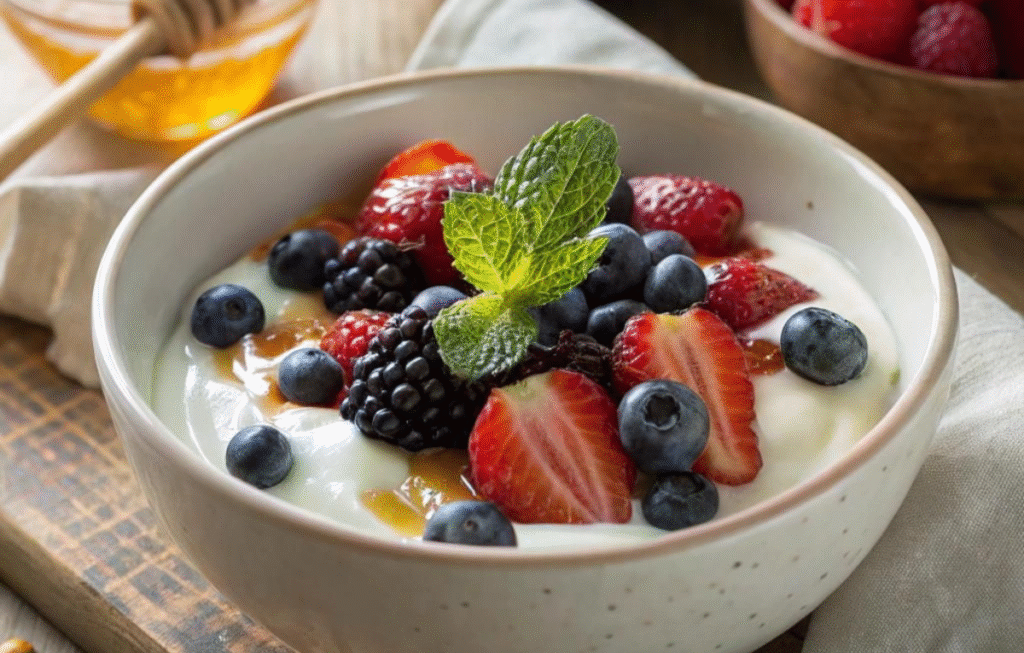
Greek yogurt is very widely popular as a health food everywhere in the world today. And for a good reason. Not only is it high in protein, but it also has probiotics, live bacteria that support digestive health.
Why It’s Great for Gut Health:
- A serving of Greek yogurt has more than 10 grams of protein.
- It has probiotics such as Lactobacillus and Bifidobacterium, which fortify the good bacteria of the gut.
- It is light and easily digestible, particularly for people who are mildly lactose intolerant.
How to Include It:
- You can mix fruit and chia seeds into your breakfast.
- You can create it as a smoothie base, which will both taste better and be healthier.
- You can substitute mayonnaise with it in salads or dips.
Dietitian Tip : Always use unsweetened Greek yogurt, since added sugar can degrade your gut health.
2. Lentils – Plant-Based Protein with Prebiotic Fiber
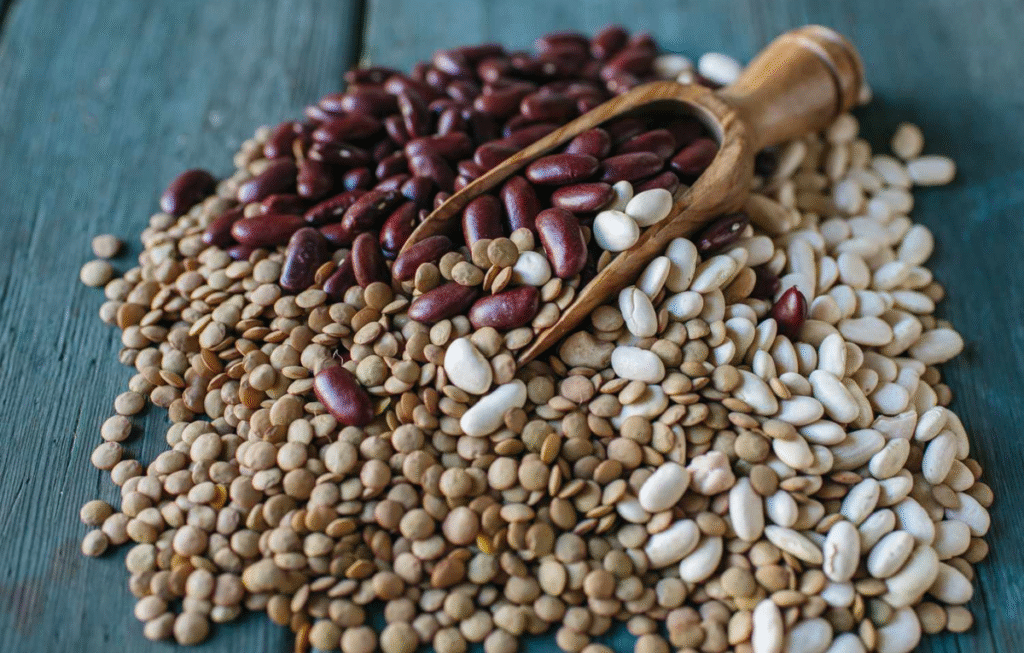
Lentils are a great source of plant protein for vegetarians. A half cup of cooked lentils has approximately 9 grams of protein.
Why It’s Great for Gut Health:
- Lentils have prebiotic fiber that nourishes beneficial gut bacteria.
- It promotes the formation of short-chain fatty acids (SCFAs), which decrease intestinal inflammation.
- It also has iron, magnesium, and folate, which are needed for repairing cells and energy.
How to Include It:
- You can serve lentil soup for dinner.
- You can put it on a quinoa bowl or salad.
- You can have sprouted lentils with spices and lemon.
Dietitian Tip: Soak lentils before cooking. This gets them to cook in half the time and avoids gas.
3. Eggs – The Complete Protein for Gut Repair
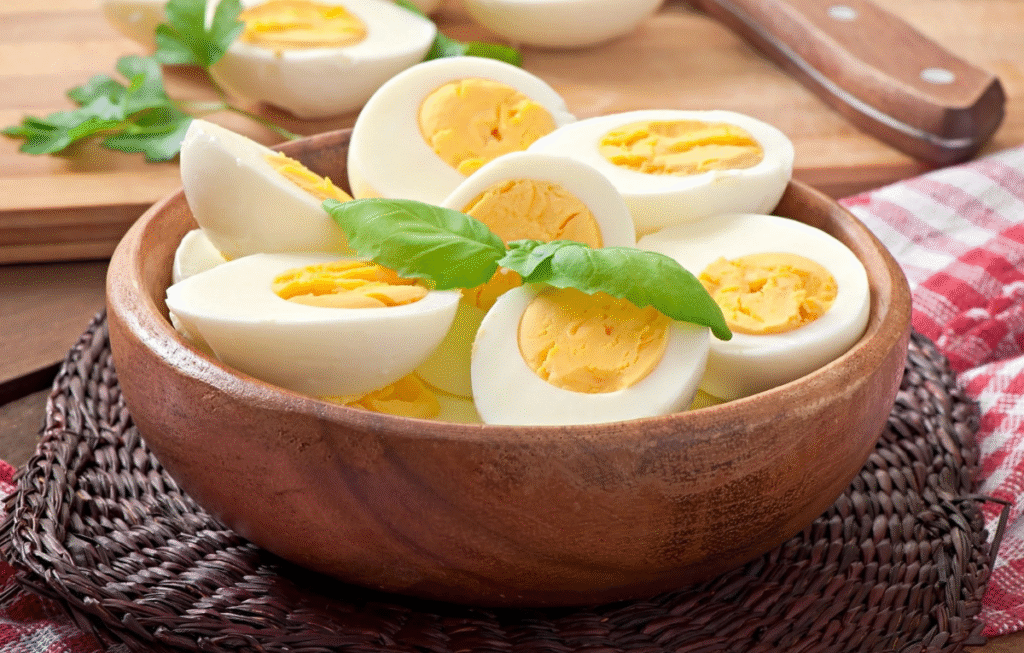
Eggs are “complete proteins” since they have all the nine essential amino acids.
Why It’s Great for Gut Health:
- Egg whites are protein-rich that repair gut cells.
- The yolk consists of vitamins A, D, and E, which toughen the mucous lining of the gut.
- Eggs are not cumbersome on the stomach and are light to digest.
How to Include It:
- Consume boiled eggs in breakfast with brown bread or salad.
- You may have a vegetable omelet.
- Top quinoa or a bowl of salad with poached eggs.
Dietitian Tip: Consume eggs along with vegetables such as spinach, tomatoes, and avocado. It makes it even more healthy.
4. Chickpeas – Fiber + Protein Combo for Happy Gut
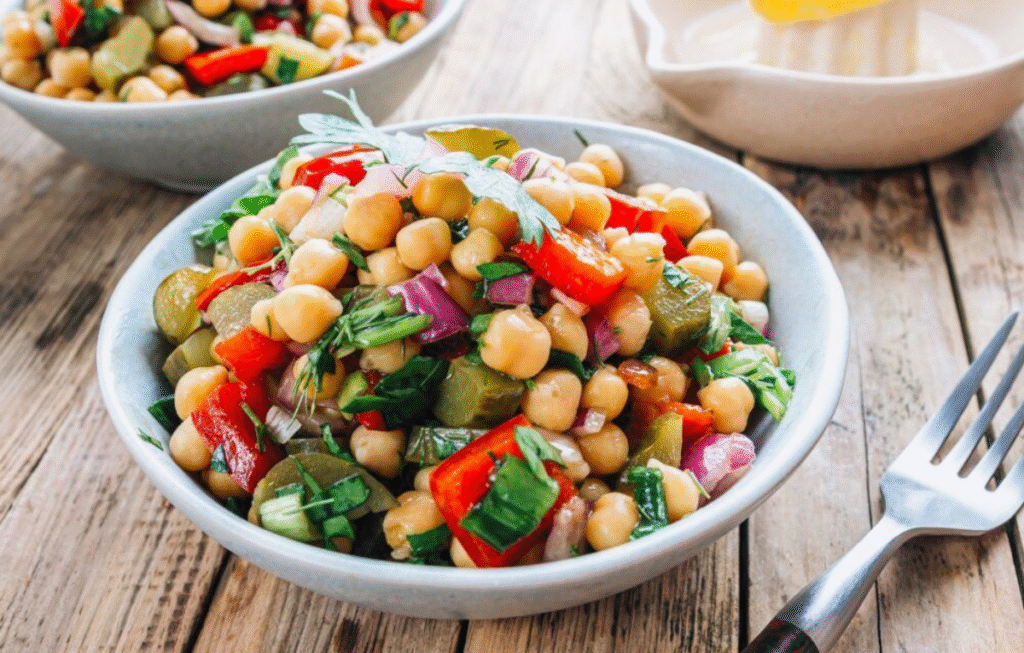
Chana (kabuli chana or black gram) is a staple in Indian households. A half cup of chickpeas has 7–8 grams of protein and plenty of fiber.
Why It’s Great for Gut Health:
- Soluble fiber in chickpeas controls blood sugar and aids digestion.
- Chanas boost the good bacteria (bifidobacteria) in the intestines.
- It has resistant starch that digests slowly and feeds the bacteria.
How to Include It:
- Consume roasted chickpeas as a snack.
- You can prepare chickpea masala or hummus and consume it.
- You can include it in salads and bowls for an added protein punch.
Dietitian Tip: Rinse canned chickpeas well before using them to prevent gas.
5. Lean Chicken or Fish – Clean Animal Protein
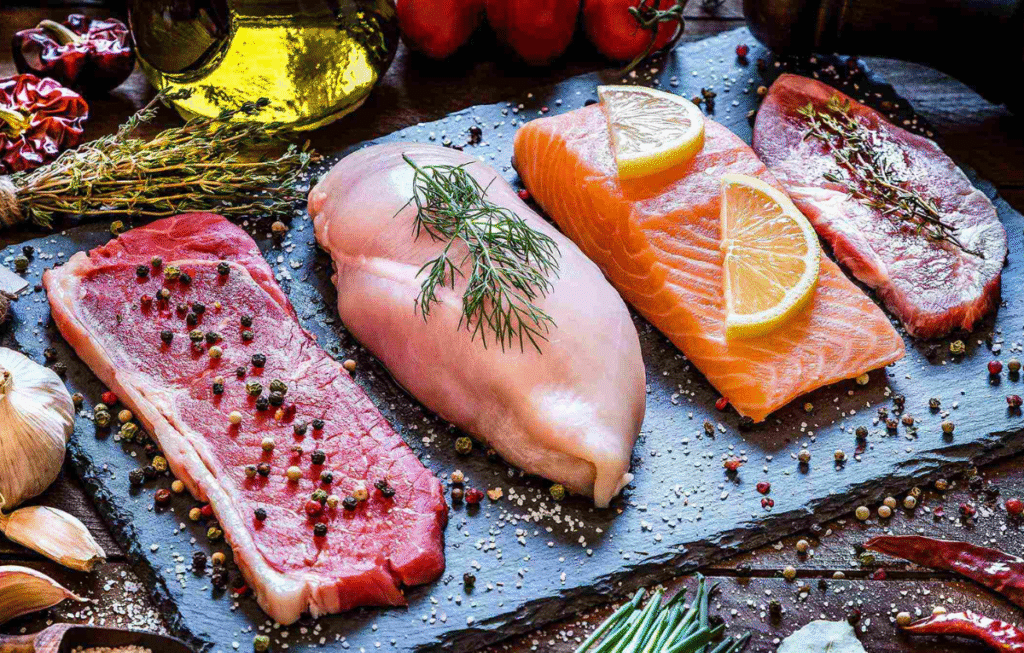
If you’re a non-veggie, chicken and fish make good protein sources.
Why It’s Great for Gut Health:
- Chicken and fish are light and easily digestible compared to red meat.
- The amino acids present in them heal the intestines.
- Fatty fish such as salmon include omega-3 fatty acids that lower intestinal inflammation.
How to Include It:
- Consume grilled chicken breast with spices and herbs.
- Prepare fish curry, salmon bowls, or soup.
- Boiled or shredded chicken can be incorporated into salads and wraps.
Dietitian Tip: Steer clear of deep-fried meat foods, which lead to inflammation of the intestines.
Additional Gut-Friendly Protein Boosters
Besides the 5 above, you may also include the following in your diet:
- Quinoa – Gluten-free and high in fiber.
- Tofu and tempeh – Soy-based and very easy to digest.
- Pumpkin seeds – Tiny but high in protein and minerals.
Practical Tips to Get the Most Out of Your Protein
- Break your diet up over the day – Rather than eating a big lump of protein in one go, break it up into a space between breakfast, lunch, and dinner.
- Eat with fiber – Pair protein with vegetables and grain to enhance digestion.
- Stay hydrated – Protein needs water to digest so ensure a minimum of 8 glasses of water.
- Listen to your body – If a protein food causes gas or heaviness, substitute it.
Conclusion
Good gut health does not call for expensive supplements or complicated diet rules-it depends on choices that one makes every day. 120 grams of protein-dense foods such as Greek yogurt, lentils, eggs, chicken or fish, and chickpeas assist in fixing the gut, bringing in nutrients, and making the person more resistant to disease.
Kick-off with the tiniest of changes:
- Having that usual sugary cereal for breakfast, instead eat it with Greek yogurt.
- Twice a week, give lentils or beans a try in your lunch.
- Roasted chickpeas or a good hummus can keep you going through the day.
Slowly but surely, you will begin to feel less bloated, lighter on your stomach, and more energetic with an elevated mood. Remember that it is often referred to as your second brain, so take care of that by giving it right proteins and a balanced diet to keep your second brain smiling!
FAQs:-
What are some good high-protein foods for a healthy gut?
Greek yogurt, lentils, eggs, chickpeas, and lean chicken are dietitian-recommended choices.
How can I add more protein to my meals naturally?
Include eggs at breakfast, legumes at lunch, nuts as snacks, and lean meats or tofu at dinner.
Why is protein important for gut health?
Protein helps repair gut lining, supports healthy gut bacteria, and improves digestion.
Medical Disclaimer
The information provided on Health Tips India is intended for educational and informational purposes only. It should not be considered a substitute for professional medical advice, diagnosis, or treatment.
Always consult a qualified healthcare professional before making any health-related decisions or changes to your diet, exercise, or medical routine.
SamhithaHealth & Wellness Content Writer
a Health & Wellness Content Writer with over 6 years of experience creating research-based health articles. She specializes in nutrition, weight management, diabetes care, skin health, and healthy lifestyle practices. Here content is carefully written using trusted medical and scientific sources to ensure accuracy and clarity for readers.

